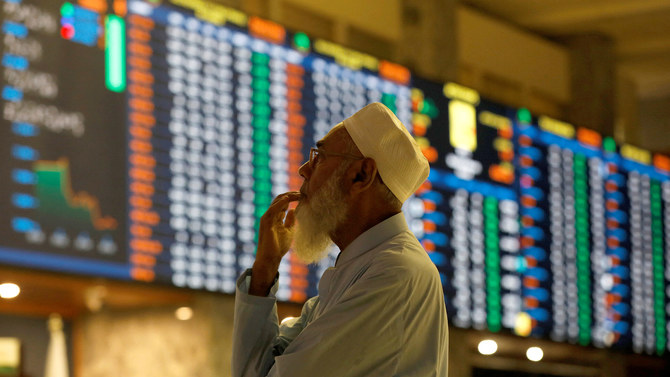KARACHI: Pakistan’s stocks posted highest single-day gains and closed 5.9 percent higher on Monday, stock analysts said, as the jubilant bulls reacted positively to the much-awaited confirmation of the International Monetary Fund (IMF) bailout.
Pakistan heaved a huge sigh of relief last week after reaching a staff-level pact with the IMF on a $3 billion stand-by arrangement, a decision long awaited by the South Asian nation teetering on the brink of default.
The Pakistan Stock Exchange opened at 2,231 points on Monday for the first time in the history of the country’s bourse. Its last highest one-day increase in points was 1,700 in April 2022.
The key stock index closed at 43,899 points after gaining 2,446 points at the end of the trading session.
“This was a much-anticipated rally after better-than-expected, short-term financing deal with the IMF,” Muhammad Sohail, CEO of Karachi-based Topline Securities brokerage firm, told Arab News.
“This is not just money that matters but this agreement has also provided a future roadmap to the current, caretaker and the next governments.”
Sohail foresaw the market hitting the 45,000-level in the short run and surging to the 48,000 points in the long run after Pakistan receives expected inflows from Saudi Arabia and United Arab Emirates (UAE).
The abnormal activity at the bourse led to the halt of the market soon after its opening as the index hit the 5 percent upper cap limit imposed on stock prices.
“Out of the total index halts witnessed in the PSX's history, today's halt marks the second time only that it occurred in a positive upswing, the first was witnessed back in April 2020,” said Tahir Abbas, research head at the Arif Habib Limited brokerage house.
“In contrast, there have been seven previous instances of halts in negative movement.”
Despite the fact that many stocks remained on the upper side and the market remaining off for an hour, Rs11 billion worth of shares were traded in ready and future market, higher than the last 3 months' average daily volume of Rs7 billion, according to a Topline Securities report.
“Interestingly, with 6% rally in the benchmark KSE100 index, more than 75 stocks closed at 7.5% upper limit,” the report read.
“This includes index stocks with approximately 40% weight where there was no seller at the current price.”
Subject to the IMF’s board approval in July, the stand-by arrangement (SBA) provides breathing space to the Pakistani economy and was announced a day before Pakistan’s previous $6.5 billion loan program with the IMF expired.
Cash-strapped Pakistan will get $1.1 billion in funds under the new financing arrangement right after the IMF’s board meeting in mid-July. The new deal provides Pakistan more than the $2.5 billion disbursement it expected to receive under the Extended Fund Facility (EFF) program that concluded incompletely on June 30, 2023.
The new deal came through after Finance Minister Ishaq Dar revised the federal budget the government passed on June 9, 2023. Dar increased Pakistan’s revenue collection target to Rs9.415 trillion ($33 billion) and put total spending at Rs14.480 trillion ($51 billion), increasing the petroleum levy from Rs50 to Rs60 per liter.
Authorities have taken Rs215 billion ($752 million) additional tax measures, cut Rs85 billion expenditures, hiked allocations under the social safety Benazir Income Support Program (BISP) by Rs16 billion, and withdrew amnesty on foreign exchange inflows, while the central bank jacked up policy rate by 1 percent to record high at 22 percent in an emergency meeting.



















